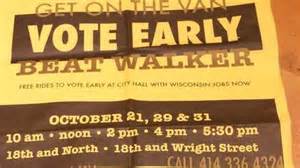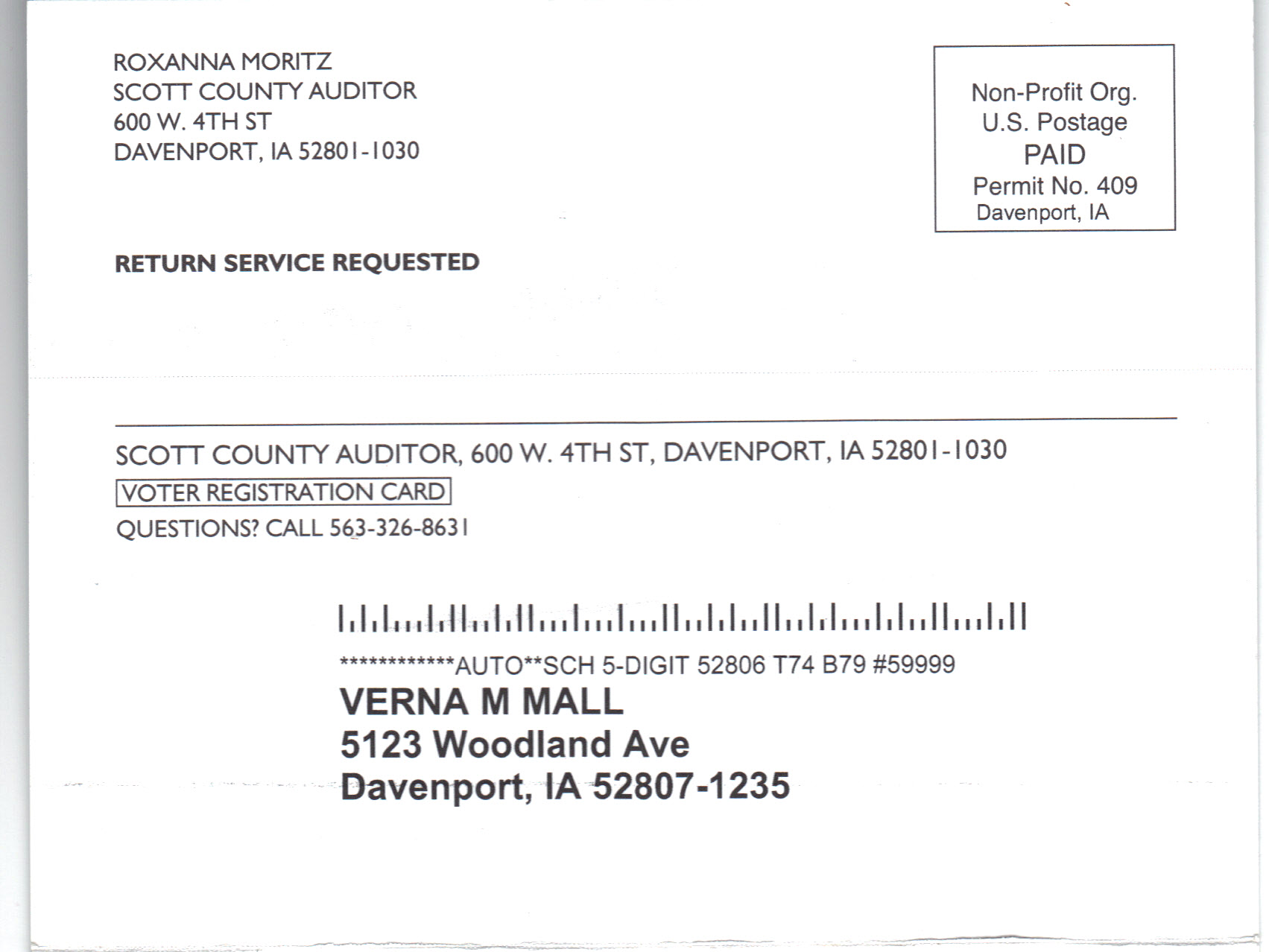For the record, it is our belief that in order to prevent fraud by any individual malcontent or shaver of any political party or no political party, the single best way to reduce fraudulent voting activity is to require photo voter ID at the time of registration and all voting. Absentee voting should be returned to its limited criterion. Voter turn-out was as high or higher under the older terms and conditions. Less early voting enhances good government, serving to facilitate more voter information, voter participation and confidence in the vote. The system in Iowa as it stands now is vulnerable to fraud particularly of the “ones and twos” due to a variety of factors. The unfathomable laxity in removing dead people from registered voter lists is one fraud enabling factor as described herein.
In the next few days we will have another post dealing more directly with the political contra-indications of encouraging early voting, still a fetish present among Republican operatives and consultants. Maybe someday they will figure out that if Hillary likes it is probably bad for Republicans. We will include some local statistics to back up our case.
In the meantime let’s play a sort of scenario game in order to uncover ways to improve voting integrity. Even simply asking questions about the system in light of the laxity of the regulations can lead to uncovering vulnerabilities to the integrity of the vote.
Consider this imagined but plausible scenario:
 “Old Joe” was registered to vote in a fair sized county in Iowa. “Old Joe” dies some time before an election. Joe was registered in a certain political party (or not) and always voted a certain way. Somebody, let’s call him Frank, reminisces and feels its a shame Joe didn’t get this last vote in. Indeed Joe really liked (or really hated) one of the candidates and it just seemed doubly unfair because of that. Frank checks and sees that Ol’ Joe has not been removed from the eligible voter rolls. Sharing Joe’s outlook on things political and wanting to do him one last favor and help along their “shared” interests.
“Old Joe” was registered to vote in a fair sized county in Iowa. “Old Joe” dies some time before an election. Joe was registered in a certain political party (or not) and always voted a certain way. Somebody, let’s call him Frank, reminisces and feels its a shame Joe didn’t get this last vote in. Indeed Joe really liked (or really hated) one of the candidates and it just seemed doubly unfair because of that. Frank checks and sees that Ol’ Joe has not been removed from the eligible voter rolls. Sharing Joe’s outlook on things political and wanting to do him one last favor and help along their “shared” interests.
Now review the rules relevant in Iowa to Old Joe (r.i.p.) who let’s assume had been at least an intermittent voter whether or not absentee:
- Send in an absentee ballot request, the form to be sent in is available like confetti, included ubiquitously with campaign literature, virtually littering door steps during campaign season, and of course available online.
- No reason is needed to request an absentee ballot.
- The signature on the absentee ballot request need not be notarized or witnessed.
- The information to fill out the form is readily available by anyone with a passing familiarity with someone else, particularly the elderly. The most taxing, is the last four digits of Joe’s social security number (assuming it is cross checked anyway). On that score voting in person as someone is arguably easier as none of it is normally required.
 Frank votes absentee himself, or otherwise knows the ropes, and requests an absentee voter ballot for Old Joe. The request is received and automatically sent out on a timely basis after being checked against the registered voter list. Unfortunately for the integrity of the vote, because of the extensive lag time, Old Joe has not been removed. So out the auditor’s door the absentee ballot is sent and in the mailbox the absentee ballot arrives, big and obvious as life. Frank easily picks it out, he needn’t even live at the same address, and votes it and sends it in for Old Joe.
Frank votes absentee himself, or otherwise knows the ropes, and requests an absentee voter ballot for Old Joe. The request is received and automatically sent out on a timely basis after being checked against the registered voter list. Unfortunately for the integrity of the vote, because of the extensive lag time, Old Joe has not been removed. So out the auditor’s door the absentee ballot is sent and in the mailbox the absentee ballot arrives, big and obvious as life. Frank easily picks it out, he needn’t even live at the same address, and votes it and sends it in for Old Joe.
 How likely is it that anyone would even suspect a fraudulent vote occurred at a busy auditors office? Little had changed since Joe’s passing . . . same apartment building, same rented duplex, same house perhaps never in Joe’s name anyway, or even if it was would it make any difference in the typical level of verification? The ballot would be sent to Old Joe’s address in a batch and would arrive as if Joe was alive.
How likely is it that anyone would even suspect a fraudulent vote occurred at a busy auditors office? Little had changed since Joe’s passing . . . same apartment building, same rented duplex, same house perhaps never in Joe’s name anyway, or even if it was would it make any difference in the typical level of verification? The ballot would be sent to Old Joe’s address in a batch and would arrive as if Joe was alive.
Once it is sent in, given the boiler room counting activities at or about election day when 30% to 50% of the votes might be by mail, the vote will be counted. Who is going to know the difference? There is no pulling such a vote back even if it is discovered to be fraudulent later, which while unlikely ever, if ever, would be after the election is certified.
The above is an imagined onesey-twosey vote fraud scenario by friend or family, involving a deceased person. It is possible not only because of the openness indeed intensity of effort to get people to vote by mail but because there is an atrocious delay in getting the deceased removed from the registered voter list. It would not require anyone very close to the deceased to pull it off.
Why has there ever been a delay in removing the dead from registered voter lists of more than a few days or a month at most? Why haven’t county auditors petitioned to change whatever they pretend is holding them back? And if they have, why has it not been done?
Consider the voter registration card sent to this writer’s mother (a permanent Scott County resident who died in Scott County) I believe two years after she died (further verification of this fact is available)
While my mother’s name has now been removed we are aware of reports across the state of other dead people still maintained on registered voter lists . The few mistakes that would be made of de-listing someone out of confusion based even on perfunctory checks of the obituaries by auditor staffs would not prevent that person from voting. They could simply be voted provisionally as is done in other circumstances pending verifications. We are also aware that police departments in Iowa check obituaries daily to update their data bases, even double check to verify accuracy. Why can’t or don’t county auditors?
Other voter fraud scenarios:
Could vote by mail fraud be done by one or more persons in a concerted effort? Perhaps a black- ops project of making a list of diseased, or much broader yet, unlikely or inactive voters and figuring out the best ones to vote surreptitiously? Even the religious election day voter, call them “tardy” by the lights of the hurry up and vote standards, could have their vote “checked” by an absentee vote unbeknownst to him or her until they arrive to vote on election day. And in such a scenario that fraudulent vote may still count because counting of absentee votes often begins the day before election day. Such a victim will still get to vote (provisionally) but the vote may be countered by the fraudulent vote.
The purpose may not even be to get the fraudulent vote counted as much as to flummox the election, create controversy, feed resentment, or create scandal about the likely winner. Why should any of these scenarios be so ridiculously easy to achieve?
We mentioned at the outset that absentee a.k.a. “vote by mail” fraud is arguably less vulnerable than election day “in person” voting. The details need not be elaborated on but the availability of voting history and a team with a little hutzpa could generate scores of votes for their purposes in an hours time. That is, in the continued absence of an automatic requirement of submission of a photo ID prior to voting.
We believe willful people can game the Iowa “system’ with impunity or little danger of getting caught. That others realize that Iowa’s voting system does not require an ID is shown in these links:
http://elections.mytimetovote.com/iowa.html
Quick facts — Iowa Voting Same Day Registration : Yes
Voter Registration deadline : 10 day(s) before election
Early Voting : Yes — Voting By Absentee Ballot : Yes
Voter Id Requirement : No
http://ballotpedia.org/Voting_in_Iowa
“Generally speaking, identification is not required”


